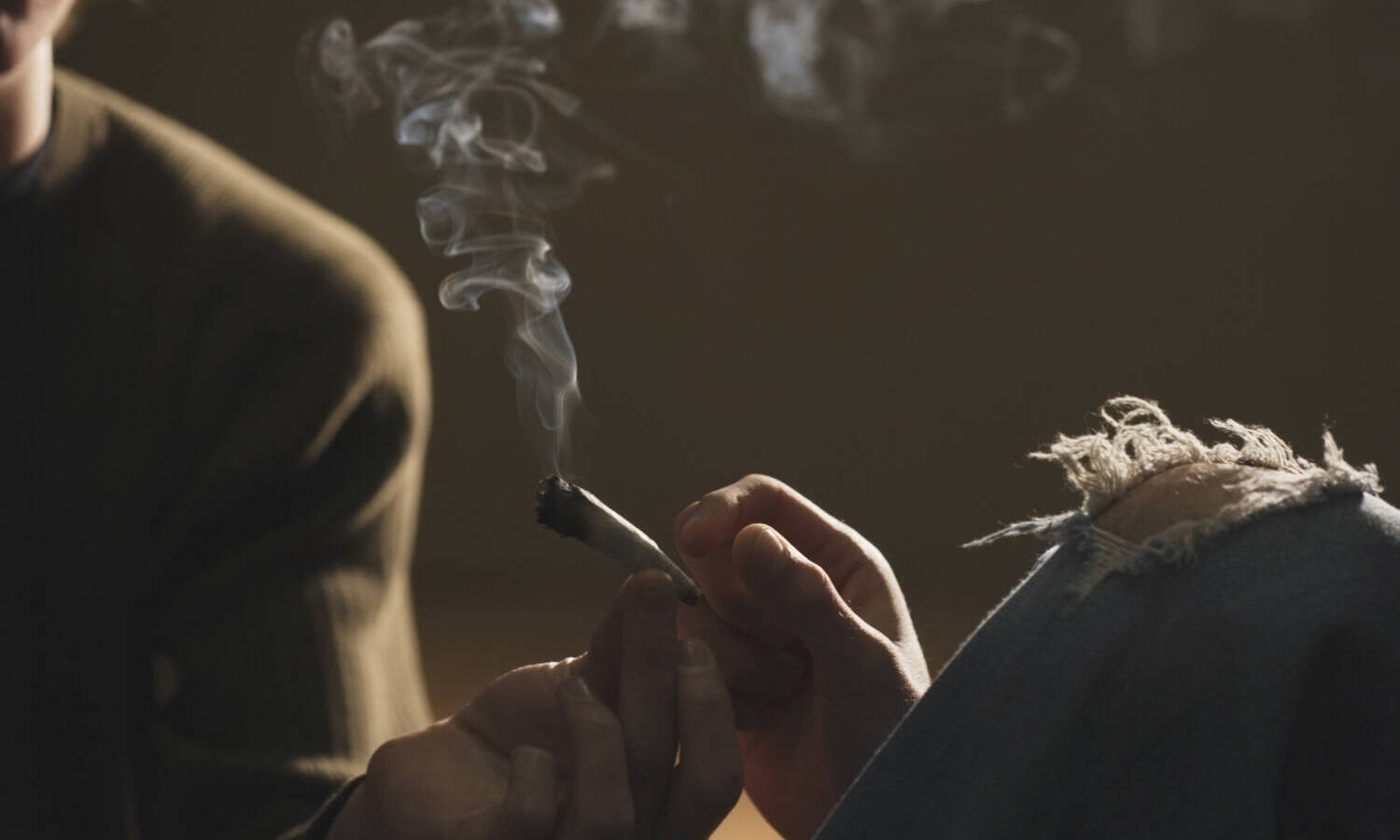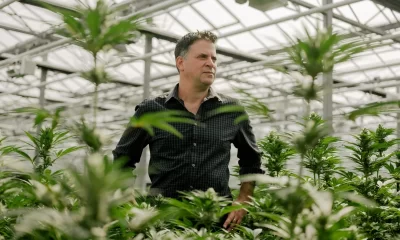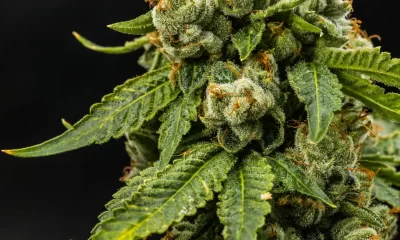Business
Strict Rules New Jersey Marijuana Consumption Lounges Face

Other states have seen creative workarounds, such as food delivery or food trucks parked outside. However, with either option, the cannabis company is giving up some potential profit.
The New Jersey Cannabis Regulatory Commission (NJ-CRC) recently approved proposed rules and regulations for cannabis consumption lounges in the state, but if some things don’t change, it will be difficult for these businesses to be profitable.
The biggest issue with the suggested rules is the inability to sell anything but cannabis — no food or alcohol.
“I often tell my clients that a lounge will operate more like a hospitality environment rather than a retail environment,” said Sara Stewart, founder of Ritual Cannabis Hospitality, who helps cannabis owners build consumption lounges. “Your profit margins are lower, and instead of averaging $60 a person, it’s more like $30.” That means these operators need additional revenue streams, which the current New Jersey rules don’t allow for.
“If you don’t have food, that’s a huge hurdle for the profitability of a lounge,” Stewart said.

She speaks from experience. Stewart built the Lowell Cafe in California (now called the Original Cannabis Cafe), which serves food and beverages, but she also built one for Green Thumb Industries (OTC: GTBIF) in Illinois without that add on.
“I saw the direct correlation that food brings to a lounge. I saw the normalness. I saw the profitability,” Stewart said.
She noted that Nevada is moving forward with food at consumption lounges — a lead that New Jersey could follow.
Some states that have legalized consumption lounges without food have seen creative workarounds, such as food delivery or food trucks parked outside. However, with either option, the cannabis company is giving up some potential profit.
Stewart also noted that building a commercial kitchen from scratch is expensive, and that’s why most restaurants take over a previously built-out space. Cannabis operations might not be able to find such a space available. It’s a difficult puzzle to solve for the owners.
Another issue with lounges without other forms of entertainment or food and beverages? Overconsumption. Stewart thinks that a lounge with food that sells smaller amounts of cannabis, such as pre-rolls, would allow an operation to make a profit without overselling to the customer.
“Imagine a bar that outsourced liquor but sold food on site. It wouldn’t be profitable,” Stewart pointed out.
Lounges that sell larger amounts run into problems with either not allowing customers to leave with unused products (motivating them to overconsume) or leaving with extra products which put them into competition with dispensaries.

New Jersey’s Lounge Laws
The rules are currently in a 60-day public comment period, after which officials plan to finalize the regulations. The operations are being called marijuana consumption areas (MCA).
Here are some of the proposed rules:
- The MCA endorsement is valid for one year and may be renewed annually upon the renewal of the marijuana retail license or the medical marijuana dispensary’s permit.
- Consumers can bring their own cannabis to the lounge – either medical or adult-use products.
- A lounge can allow free samples of medical or adult-use cannabis.
- Customers can take any unconsumed cannabis with them, but it must be repackaged to meet state requirements.
- Strict sales limits to prevent overselling.
- Customers must be 21 and up.
The proposed rules carry a $1,000 application fee for all applicants but, if approved, microbusinesses will face an additional $1,000 licensing fee, while a standard consumption lounge business license would cost $5,000.
Big No-Nos
- No alcohol or cigarettes can be consumed or sold in the lounge.
- No retail food operations.
- Employees can’t consume while on the job.
- Any cannabis left by consumers at the lounge must be destroyed.
Source: https://thefreshtoast.com/cannabusiness/new-jersey-consumption-lounges-face-strict-rules/
Business
New Mexico cannabis operator fined, loses license for alleged BioTrack fraud

New Mexico regulators fined a cannabis operator nearly $300,000 and revoked its license after the company allegedly created fake reports in the state’s traceability software.
The New Mexico Cannabis Control Division (CCD) accused marijuana manufacturer and retailer Golden Roots of 11 violations, according to Albuquerque Business First.
Golden Roots operates the The Cannabis Revolution Dispensary.
The majority of the violations are related to the Albuquerque company’s improper use of BioTrack, which has been New Mexico’s track-and-trace vendor since 2015.
The CCD alleges Golden Roots reported marijuana production only two months after it had received its vertically integrated license, according to Albuquerque Business First.
Because cannabis takes longer than two months to be cultivated, the CCD was suspicious of the report.
After inspecting the company’s premises, the CCD alleged Golden Roots reported cultivation, transportation and sales in BioTrack but wasn’t able to provide officers who inspected the site evidence that the operator was cultivating cannabis.
In April, the CCD revoked Golden Roots’ license and issued a $10,000 fine, according to the news outlet.
The company requested a hearing, which the regulator scheduled for Sept. 1.
At the hearing, the CCD testified that the company’s dried-cannabis weights in BioTrack were suspicious because they didn’t seem to accurately reflect how much weight marijuana loses as it dries.
Company employees also poorly accounted for why they were making adjustments in the system of up to 24 pounds of cannabis, making comments such as “bad” or “mistake” in the software, Albuquerque Business First reported.
Golden Roots was fined $298,972.05 – the amount regulators allege the company made selling products that weren’t properly accounted for in BioTrack.
The CCD has been cracking down on cannabis operators accused of selling products procured from out-of-state or not grown legally:
- Regulators alleged in August that Albuquerque dispensary Sawmill Sweet Leaf sold out-of-state products and didn’t have a license for extraction.
- Paradise Exotics Distro lost its license in July after regulators alleged the company sold products made in California.
Golden Roots was the first alleged rulebreaker in New Mexico to be asked to pay a large fine.
Source: https://mjbizdaily.com/new-mexico-cannabis-operator-fined-loses-license-for-alleged-biotrack-fraud/
Business
Marijuana companies suing US attorney general in federal prohibition challenge

Four marijuana companies, including a multistate operator, have filed a lawsuit against U.S. Attorney General Merrick Garland in which they allege the federal MJ prohibition under the Controlled Substances Act is no longer constitutional.
According to the complaint, filed Thursday in U.S. District Court in Massachusetts, retailer Canna Provisions, Treevit delivery service CEO Gyasi Sellers, cultivator Wiseacre Farm and MSO Verano Holdings Corp. are all harmed by “the federal government’s unconstitutional ban on cultivating, manufacturing, distributing, or possessing intrastate marijuana.”
Verano is headquartered in Chicago but has operations in Massachusetts; the other three operators are based in Massachusetts.
The lawsuit seeks a ruling that the “Controlled Substances Act is unconstitutional as applied to the intrastate cultivation, manufacture, possession, and distribution of marijuana pursuant to state law.”
The companies want the case to go before the U.S. Supreme Court.
They hired prominent law firm Boies Schiller Flexner to represent them.
The New York-based firm’s principal is David Boies, whose former clients include Microsoft, former presidential candidate Al Gore and Elizabeth Holmes’ disgraced startup Theranos.
Similar challenges to the federal Controlled Substances Act (CSA) have failed.
One such challenge led to a landmark Supreme Court decision in 2005.
In Gonzalez vs. Raich, the highest court in the United States ruled in a 6-3 decision that the commerce clause of the U.S. Constitution gave Congress the power to outlaw marijuana federally, even though state laws allow the cultivation and sale of cannabis.
In the 18 years since that ruling, 23 states and the District of Columbia have legalized adult-use marijuana and the federal government has allowed a multibillion-dollar cannabis industry to thrive.
Since both Congress and the U.S. Department of Justice, currently headed by Garland, have declined to intervene in state-licensed marijuana markets, the key facts that led to the Supreme Court’s 2005 ruling “no longer apply,” Boies said in a statement Thursday.
“The Supreme Court has since made clear that the federal government lacks the authority to regulate purely intrastate commerce,” Boies said.
“Moreover, the facts on which those precedents are based are no longer true.”
Verano President Darren Weiss said in a statement the company is “prepared to bring this case all the way to the Supreme Court in order to align federal law with how Congress has acted for years.”
While the Biden administration’s push to reschedule marijuana would help solve marijuana operators’ federal tax woes, neither rescheduling nor modest Congressional reforms such as the SAFER Banking Act “solve the fundamental issue,” Weiss added.
“The application of the CSA to lawful state-run cannabis business is an unconstitutional overreach on state sovereignty that has led to decades of harm, failed businesses, lost jobs, and unsafe working conditions.”
Business
Alabama to make another attempt Dec. 1 to award medical cannabis licenses

Alabama regulators are targeting Dec. 1 to award the first batch of medical cannabis business licenses after the agency’s first two attempts were scrapped because of scoring errors and litigation.
The first licenses will be awarded to individual cultivators, delivery providers, processors, dispensaries and state testing labs, according to the Alabama Medical Cannabis Commission (AMCC).
Then, on Dec. 12, the AMCC will award licenses for vertically integrated operations, a designation set primarily for multistate operators.
Licenses are expected to be handed out 28 days after they have been awarded, so MMJ production could begin in early January, according to the Alabama Daily News.
That means MMJ products could be available for patients around early March, an AMCC spokesperson told the media outlet.
Regulators initially awarded 21 business licenses in June, only to void them after applicants alleged inconsistencies with how the applications were scored.
Then, in August, the state awarded 24 different licenses – 19 went to June recipients – only to reverse themselves again and scratch those licenses after spurned applicants filed lawsuits.
A state judge dismissed a lawsuit filed by Chicago-based MSO Verano Holdings Corp., but another lawsuit is pending.
Source: https://mjbizdaily.com/alabama-plans-to-award-medical-cannabis-licenses-dec-1/
-

 Business2 years ago
Business2 years agoPot Odor Does Not Justify Probable Cause for Vehicle Searches, Minnesota Court Affirms
-

 Business2 years ago
Business2 years agoNew Mexico cannabis operator fined, loses license for alleged BioTrack fraud
-

 Business2 years ago
Business2 years agoAlabama to make another attempt Dec. 1 to award medical cannabis licenses
-

 Business2 years ago
Business2 years agoWashington State Pays Out $9.4 Million in Refunds Relating to Drug Convictions
-

 Business2 years ago
Business2 years agoMarijuana companies suing US attorney general in federal prohibition challenge
-

 Business2 years ago
Business2 years agoLegal Marijuana Handed A Nothing Burger From NY State
-

 Business2 years ago
Business2 years agoCan Cannabis Help Seasonal Depression
-

 Blogs2 years ago
Blogs2 years agoCannabis Art Is Flourishing On Etsy













